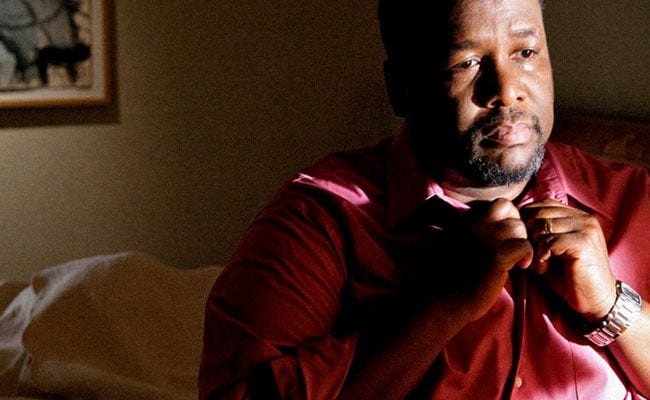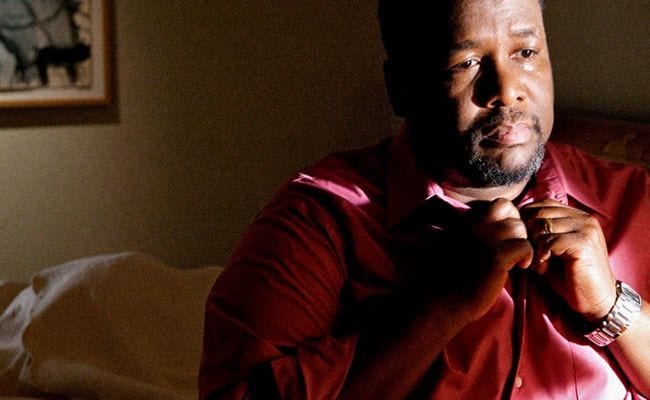
“One is the loneliest number that you’ll ever do,” according to Harry Nilsson’s famous song. But Four, Joshua Sanchez’s first feature film, proposes that you can be just as lonely among greater numbers. Based on Christopher Shinn’s play, set in a suburban town in 1996, and now available on iTunes and Netflix, Four follows a quartet of characters during an American Fourth of July. Each has needs and secrets, and each has trouble sharing them.
The movie makes these needs and secrets a bit too obvious. It opens on a teenager (Emory Cohen) in a plaid shirt, standing by a window. Even before we know his name is June, we can see that he’s lonely: the camera shows only the back of his head as he observes the holiday festivities in his own backyard. Leaving the house, June assures his concerned mother (Kathryn Meisle) that he’s going to go see fireworks with friends, but actually, he’s sneaking off to meet a much older man, Joe (Wendell Pierce), a college professor he’s met online.
The evolving relationship between Joe and June is paralleled by another, equally complicated romance, between Joe’s daughter Abigayle (Aja Naomi King) and her boyfriend Dexter (E.J. Bonilla). In pairs and as individuals, each is struggling to feel safe and assured, fearful of what’s ahead, and caught up in dishonesties born of that fear. Believing that her father is off on a business trip, Abi stays home to care for her bedridden mother (Yolonda Ross); Dexter tries to get her attention, alternately goading her and seducing her over the holiday night. What Abi doesn’t know is that Joe and June are on their way to a motel room, each with his own idea of what he wants from the encounter.
During their first face-to-face meeting, June avoids eye contact with Joe, stutters and mumbles. His nervousness — perhaps emerging from his youth — contrasts with Joe’s assuredness and smooth charm, as he does most of the talking, almost consoling June. The younger man’s not-so-repressed self-loathing comes charging to the surface later, when he runs into an old flame, Todd (Liam Benzvi). Embarrassed and uncertain, June bolts for the nearest exit, and when Joe follows him outside, hoping to calm June. A series of close-ups reveals tensions Joe and June can’t articulate: as Joe earnestly presses June for a sign of commitment, the boy’s reddened face suggests he’s overwhelmed by his own competing desires.
At the motel, we see Joe’s own neediness. June retreats to the bathroom, insisting he wants to shower; alone, he leaves the water running as he settles onto the floor to smoke a stubby blunt. Joe talks over the water’s sound while he takes condoms out of a brown paper bag. Increasingly immersed in the story he’s telling himself, Joe takes a seat on the edge of the bed. A close-up of his face shows his eyes looking off at something — a haunting memory, a frightening future — that only he can see.
Joe slows his words, and his voice takes on a heavy weight of self-reflection. If he’s pleased to be at a motel with a cute boy like June, he’s also at least partly aware that there may be consequences (it’s not clear whether these could be legal, given the boy’s age). While we’ve seen Joe exultant, honking his car horn and yelling, “God bless America!” to holiday celebrants, we also see that he’s bothered by the lies he tells his family.
As the film cuts between father and daughter, we see consequences for her. Like Joe and June, Abi and Dexter are primarily connected by technology: they talk on the phone more than they see one another. And as for Joe and June, the technology provides a simultaneous bond and barrier. Though Abi seems comfortable with Dexter’s voice at a distance, she’s less open with him in person. Still, she sneaks out of her mother’s house to meet him, to see the fireworks.
It’s hard to miss the similarities between Dexter and Abi’s tentative, flirtatious exchange and June and Joe’s. He presses her, cajoles and seduces her: “It’s hard to talk to you,” he tells her. “You think I’m not good enough for you that I can’t understand your thoughts, or whatever’s going on in your head. I got thoughts, too. Watch, before the night is out, you gonna tell me your thoughts.” As he poses his challenge, another series of close frames isolates the two, his smile conveying a mix of affection and cockiness, her expression more confused, pulling away.
As both couples look for resolution for their differences, stretched across race and age, gender and sexuality, the film’s organization feels too neat. Four looks at loneliness as abstraction and as experience, over the course of a day devoted to another sort of abstraction, independence. Though the four do come together to share the Fourth of July, each remains isolated before a magnificent fireworks display that finally appears ironic.


![Call for Papers: All Things Reconsidered [MUSIC] May-August 2024](https://www.popmatters.com/wp-content/uploads/2024/04/all-things-reconsidered-call-music-may-2024-720x380.jpg)



